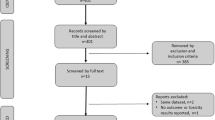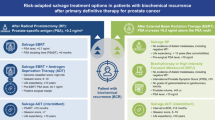Abstract
Background
Platinum-based chemotherapy is effective in men with neuroendocrine prostate cancer (NEPC), but it is unclear whether histology (adenocarcinoma vs. non-adenocarcinoma NEPC variants) is predictive of platinum sensitivity. Given that NEPC exists as a spectrum, there may be men with adenocarcinoma who might benefit from platinum chemotherapy, particularly those men with DNA repair defects.
Methods
This was a retrospective study of all of the men seen at Duke University since 2005 who had metastatic castration-resistant prostate cancer (mCRPC) and were treated with a platinum agent. Data surrounding clinical features, histology, imaging, safety, and neuroendocrine transformation were collected. Scans were re-reviewed using RECIST v1.1 criteria to estimate responses as well as calculate radiographic progression-free survival (rPFS).
Results
A database search identified 73 men with mCRPC treated with cisplatin, carboplatin, or oxaliplatin. There were three men with primary NEPC and small cell prostate cancer, and 14 with a NEPC transformation. In the first-line setting, 10 (63%) men with NEPC had a partial response (PR) compared with 14 (29%) of the men with adenocarcinoma (p = 0.017), with a median rPFS of 5.1 mo (3.1–7.8) and 4.3 mo (3.0–5.2 mo), respectively. The median overall survival was 8.5 mo (6.4–20.1 mo) for men with NEPC compared to 10.0 mo (8.0–14.4) in men with adenocarcinoma. Prostate-specific antigen (PSA) declines meeting >30%, >50%, and >90% criteria from baseline were observed in 64/57/29% of NEPC patients (n = 14) treated with platinum chemotherapy vs. 48/30/14% of men with prostate adenocarcinoma (n = 50), respectively.
Conclusions
This study suggests that NEPC histology enriches for platinum sensitivity, but that an important minority group (20–30%) of men with adenocarcinoma have a clinical benefit with platinum-based chemotherapy. Molecular predictors, such as germline or somatic mutations in DNA repair enzymes, should be evaluated for platinum responsiveness.
This is a preview of subscription content, access via your institution
Access options
Subscribe to this journal
Receive 4 print issues and online access
$259.00 per year
only $64.75 per issue
Buy this article
- Purchase on Springer Link
- Instant access to full article PDF
Prices may be subject to local taxes which are calculated during checkout



Similar content being viewed by others
References
Siegel RL, Miller KD, Jemal A. Cancer Statistics, 2017. CA Cancer J Clin. 2017;67:7–30.
Huggins C, Hodges CV. Studies on prostatic cancer - I The effect of castration, of estrogen and of androgen injection on serum phosphatases in metastatic carcinoma of the prostate. Cancer Res. 1941;1:293–7.
de Bono JS, Logothetis CJ, Molina A, Fizazi K, North S, Chu L, et al. Abiraterone and increased survival in metastatic prostate cancer. N Engl J Med. 2011;364:1995–2005.
Beer TM, Armstrong AJ, Rathkopf DE, Loriot Y, Sternberg CN, Higano CS, et al. Enzalutamide in metastatic prostate cancer before chemotherapy. N Engl J Med. 2014;371:424–33.
Parker C, Nilsson S, Heinrich D, Helle SI, O’Sullivan JM, Fossa SD, et al. Alpha emitter radium-223 and survival in metastatic prostate cancer. N Engl J Med. 2013;369:213–23.
Tannock IF, de Wit R, Berry WR, Horti J, Pluzanska A, Chi KN, et al. Docetaxel plus prednisone or mitoxantrone plus prednisone for advanced prostate cancer. N Engl J Med. 2004;351:1502–12.
de Bono JS, Oudard S, Ozguroglu M, Hansen S, Machiels JP, Kocak I, et al. Prednisone plus cabazitaxel or mitoxantrone for metastatic castration-resistant prostate cancer progressing after docetaxel treatment: a randomised open-label trial. Lancet. 2010;376:1147–54.
Kantoff PW, Higano CS, Shore ND, Berger ER, Small EJ, Penson DF, et al. Sipuleucel-T immunotherapy for castration-resistant prostate cancer. N Engl J Med. 2010;363:411–22.
Pritchard CC, Mateo J, Walsh MF, De Sarkar N, Abida W, Beltran H, et al. Inherited DNA-repair gene mutations in men with metastatic prostate cancer. N Engl J Med. 2016;375:443–53.
Mateo J, Carreira S, Sandhu S, Miranda S, Mossop H, Perez-Lopez R, et al. DNA-repair defects and olaparib in metastatic prostate cancer. N Engl J Med. 2015;373:1697–708.
Halabi S, Kelly WK, Zhou HJ, Armstrong AJ, Quinn D, Fizazi K et al. The site of visceral metastases (mets) to predict overall survival (OS) in castration-resistant prostate cancer (CRPC) patients (pts): a meta-analysis of five phase III trials. J Clin Oncol. 2014;32:671–7.
Aparicio AM, Harzstark AL, Corn PG, Wen S, Araujo JC, Tu SM, et al. Platinum-based chemotherapy for variant castrate-resistant prostate cancer. Clin Cancer Res. 2013;19:3621–30.
Nadal R, Schweizer M, Kryvenko ON, Epstein JI, Eisenberger MA. Small cell carcinoma of the prostate. Nat Rev Urol. 2014;11:213–9.
Beltran H, Prandi D, Mosquera JM, Benelli M, Puca L, Cyrta J, et al. Divergent clonal evolution of castration-resistant neuroendocrine prostate cancer. Nat Med. 2016;22:298–305.
Wang HT, Yao YH, Li BG, Tang Y, Chang JW, Zhang J. Neuroendocrine Prostate Cancer (NEPC) progressing from conventional prostatic adenocarcinoma: factors associated with time to development of NEPC and survival from NEPC diagnosis-a systematic review and pooled analysis. J Clin Oncol 2014;32:3383–90.
Bouman-Wammes E, de Munck L, van den Berg H, Beeker A, Smorenburg C, Verheul H et al. A randomized phase II trial of docetaxel plus carboplatin versus docetaxel in patients with castration-resistant prostate cancer who have progressed after response to prior docetaxel chemotherapy: The RECARDO trial. J Clin Oncol. 2017;35(suppl 6S; Abstract 166).
Sternberg CN, Petrylak DP, Sartor O, Witjes JA, Demkow T, Ferrero JM, et al. Multinational, double-blind, phase III study of prednisone and either satraplatin or placebo in patients with castrate-refractory prostate cancer progressing after prior chemotherapy: the SPARC trial. J Clin Oncol. 2009;27:5431–8.
Nakabayashi M, Sartor O, Jacobus S, Regan MM, McKearn D, Ross RW, et al. Response to docetaxel/carboplatin-based chemotherapy as first- and second-line therapy in patients with metastatic hormone-refractory prostate cancer. BJU Int. 2008;101:308–12.
Ross RW, Beer TM, Jacobus S, Bubley GJ, Taplin ME, Ryan CW, et al. A phase 2 study of carboplatin plus docetaxel in men with metastatic hormone-refractory prostate cancer who are refractory to docetaxel. Cancer. 2008;112:521–6.
Prostate Cancer, version 2. 2017 Updated on 2 February 2017. https://www.nccn.org/professionals/physician_gls/pdf/prostate.pdf. Accessed 19 Jun 2017.
Eisenhauer EA, Therasse P, Bogaerts J, Schwartz LH, Sargent D, Ford R, et al. New response evaluation criteria in solid tumours: revised RECIST guideline (version 1.1). Eur J Cancer. 2009;45:228–47.
Scher HI, Morris MJ, Stadler WM, Higano C, Basch E, Fizazi K, et al. Trial design and objectives for castration-resistant prostate cancer: updated recommendations from the prostate cancer clinical trials working group 3. J Clin Oncol. 2016;34:1402–18.
Bhattacharyya A, Ear US, Koller BH, Weichselbaum RR, Bishop DK. The breast cancer susceptibility gene BRCA1 is required for subnuclear assembly of Rad51 and survival following treatment with the DNA cross-linking agent cisplatin. J Biol Chem. 2000;275:23899–903.
Pomerantz MM, Spisak S, Jia L, Cronin AM, Csabai I, Ledet E et al. The association between germline BRCA2 variants and sensitivity to platinum-based chemotherapy among men with metastatic prostate cancer. Cancer. 2017;123:3532-9.
Cheng HH, Pritchard CC, Boyd T, Nelson PS, Montgomery B. Biallelic inactivation of BRCA2 in platinum-sensitive metastatic castration-resistant prostate cancer. Eur Urol. 2016;69:992–5.
Goodall J, Mateo J, Yuan W, Mossop H, Porta N, Miranda S et al. Circulating free DNA to guide prostate cancer treatment with PARP inhibition. Cancer Discov. 2017;7:1006-17.
Acknowledgments
This study was supported in part by the DCI P30 core grant P30 CA01423 for biostatistical core support.
Author information
Authors and Affiliations
Corresponding author
Ethics declarations
Competing interest
A.J.A. reports research funding (to Duke) from Medivation/Astellas, Bayer, Dendreon, and Janssen, Active Biotech, sanofi aventis, Gilead, Novartis, and Pfizer, and consulting/speaking with Dendreon and Sanofi aventis, consulting with Medivation/Astellas and Janssen. M.R.H. reports research funding (to Duke) from Medivation/Astellas, Acerta, Bristol Myers Squibb, Exelixis, Janssen, and Genentech; and consulting/speaking with Dendreon, Genentech, Exelixis, and Sanofi Aventis. D.J.G. reports research support from Janssen, Acerta, Millennium, Celldex, consulting with Acceleron Pharma, Astellas/Medivation, BioPharm Communications; consulting/research support from Bristol Myers Squibb Co, Exelixis Inc, Genentech, Innocrin, Pfizer Inc; and consulting/speaking/research support from Bayer Healthcare Pharmaceuticals, Dendreon Corporation, Novartis, and Sanofi Aventis. T.Z. reports research support from Janssen, Acerta, and Pfizer. R.T.G. reports consulting with Bayer Pharma AG, Halyard Health and Invivo Corp. as well as speakers bureau with Bayer Pharma AG. M.McN. reports research funding (to Duke) from Medivation/Astellas, Janssen, and Bayer Healthcare Pharmaceuticals.
Electronic supplementary material
Rights and permissions
About this article
Cite this article
Humeniuk, M.S., Gupta, R.T., Healy, P. et al. Platinum sensitivity in metastatic prostate cancer: does histology matter?. Prostate Cancer Prostatic Dis 21, 92–99 (2018). https://doi.org/10.1038/s41391-017-0017-6
Received:
Revised:
Accepted:
Published:
Issue Date:
DOI: https://doi.org/10.1038/s41391-017-0017-6
This article is cited by
-
Acquired resistance to irradiation or docetaxel is not associated with cross-resistance to cisplatin in prostate cancer cell lines
Journal of Cancer Research and Clinical Oncology (2022)
-
Clinical considerations for the management of androgen indifferent prostate cancer
Prostate Cancer and Prostatic Diseases (2021)
-
Updates in advanced prostate cancer 2018
Prostate Cancer and Prostatic Diseases (2018)



